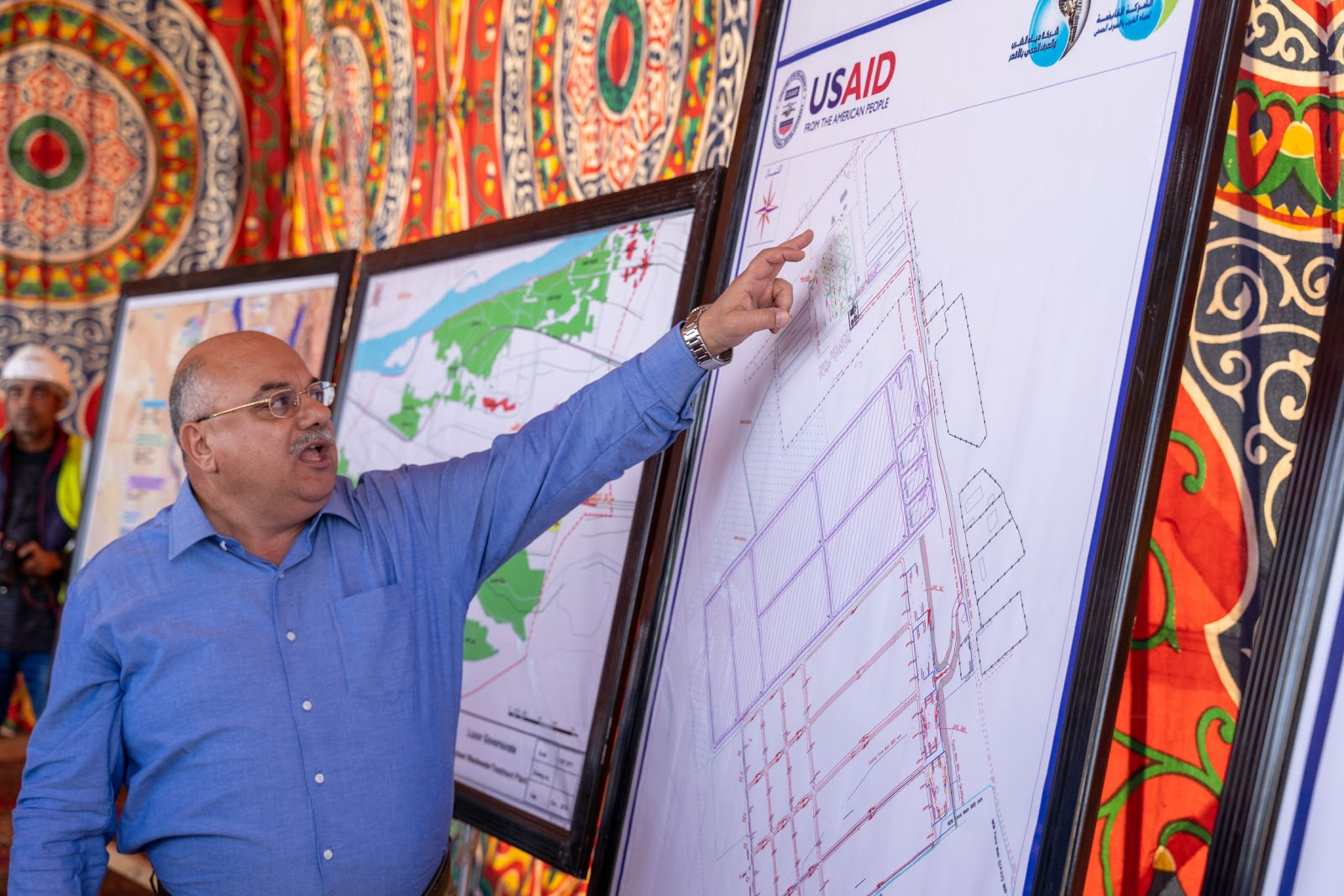Celebrating Atef Sayed’s Three Decades Advancing USAID Water, Sanitation, and Hygiene Efforts in Egypt
Over the past three decades, Atef Sayed played an integral role in USAID partnerships to transform Egypt’s water and sanitation systems. From the construction and rehabilitation of wastewater systems to the development of a water regulatory agency that operates and maintains these systems, Atef’s commitment to building strong institutions and enduring government relationships resulted in sustainable service delivery throughout much of Egypt.
A trained engineer, Atef spent much of his early career working for an American construction company in Egypt before moving to an engineering firm implementing the USAID Canal Cities Water and Wastewater Project. Atef was hired by USAID in 2000 to oversee the construction of water infrastructure in North Sinai, including drilling wells and building desalination plants, potable water transmission and distribution lines, and water reservoirs.

Photo credit: USAID/Egypt
Shifting priorities
Over his career, Atef played an integral role in evolving USAID water and sanitation priorities in Egypt.
“At first USAID’s WASH efforts in Egypt focused on infrastructure, things like building boreholes and water plants, and installing piping to carry drinking water to people’s homes. We were very successful at it. But, you can’t just fund infrastructure,” says Atef.
Throughout the 1990s, USAID WASH programs increasingly focused on sustainability to equip utilities and the Egyptian government with the capacity to operate and maintain these systems without USAID support. Atef was at the forefront of these efforts, first helping to facilitate buy-in from the Egyptian government, and then supporting local utilities and Egypt’s National Holding Company for Water and Wastewater to gain the knowledge, skills, and resources needed to properly maintain these systems.
“One lesson I’ve learned is that government buy-in must start at the design phase and not at the results phase. These programs should be the government of Egypt’s programs, not USAID’s programs,” says Atef.

Photo credit: USAID/Egypt
USAID’s long-standing partnership with the Government of Egypt is an example of the importance and success of strong local partnerships in achieving WASH and development goals.
“They give to us what we give to them,” says Atef. “From day one, I sat in their (Egyptian government officials’) offices and shared with them my vision for programs to improve WASH, and got feedback about what they really needed. We implemented the program together and now they are the service provider. They own it!”

Photo credit: USAID/Egypt.
Atef’s localization legacy
Atef is credited by his peers for helping build strong institutions and cultivating lasting relationships between the U.S. and Egyptian governments to ensure locally-led water service delivery and resources management.
"Atef was an incredible team lead, mentor, and friend. As a new Foreign Service Officer, it was a privilege to work with and learn from him. Atef encouraged us to never lose sight of the bigger picture -- sustained service provision. Infrastructure is one piece of a puzzle, and Atef viewed his work as building people, and systems, and institutions which that infrastructure supported."
- Kathleen Kirsch, Deputy Director, Office of Critical Infrastructure, USAID/Ukraine
“I first met Atef when I arrived at USAID/Egypt in August 2010. Atef showed me that being a successful engineer went beyond technical knowledge. I observed Atef leaning into his professionalism and diplomacy to advance critical infrastructure work through government to government agreements. A few months later, the Arab Spring changed everything...and I got to fully appreciate Atef's broader development and leadership skills. In the face of a regional and national crisis, Atef pivoted the Mission's infrastructure programs to create jobs and incomes for thousands of Egyptians during a period of economic instability. Atef will always be remembered as an engineer, yet his combination of creativity, compassion, and accountability set him apart as an outstanding leader and representative of USAID's mission and programs.”
- John R. Pasch, Economic Growth Officer, USAID/Burma
USAID recognizes that local leadership and ownership are essential for fostering sustainable results and is advancing efforts to shift leadership for priority setting, project design, and implementation to people and institutions with the capabilities and credibility to drive meaningful change in their own communities.

Photo credit: USAID/Egypt
USAID’s global influence has consistently been enhanced by the expertise, knowledge, and commitment of its Foreign Service Nationals (FSNs). Their unmatched comprehension of local contexts, networks, and lived experiences play a crucial role in driving development in their countries, and USAID’s efforts to promote sustainability, localization, and inclusive development.
“I’m ready to retire because after 30 years I feel that the work can be passed on to Egypt,” says Atef. “Where there was once dirty water in dams, now there is infrastructure for piped water and this is improving the health of the Egyptian people.”
This story was produced by USAID’s Center for Water with contributions from USAID/Egypt.


